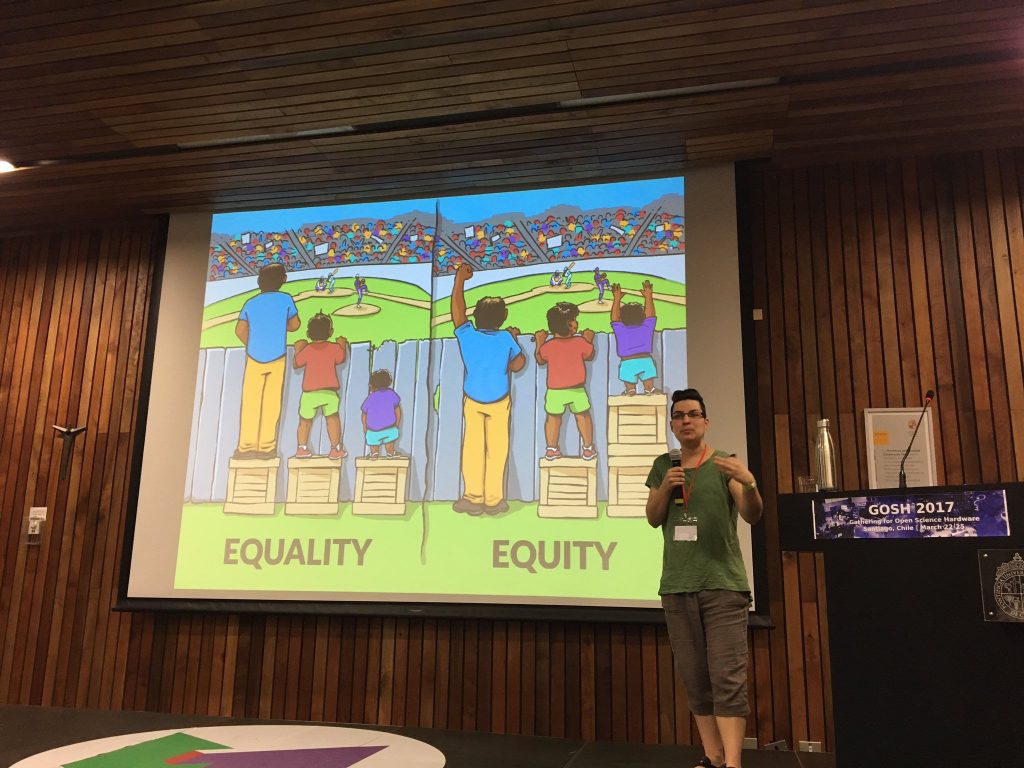 Without hardware, there is no science. Instruments, reagents, computers, and lab equipment are the platforms for producing systematic knowledge. Innovations from lenses to atomic force microscopes to DNA sequencers to particle accelerators have opened up new fields of knowledge with huge potential impacts for science and society. However, participants in the Gathering for Open Science Hardware, currently taking place at the Innovation Centre, Pontificia Universidad Católica de Chile, argue that limited access to scientific tools impedes the progress and reach of science. Black-box scientific tools block creativity and customization through high mark-ups and proprietary designs, compounded by intellectual property restrictions...
Without hardware, there is no science. Instruments, reagents, computers, and lab equipment are the platforms for producing systematic knowledge. Innovations from lenses to atomic force microscopes to DNA sequencers to particle accelerators have opened up new fields of knowledge with huge potential impacts for science and society. However, participants in the Gathering for Open Science Hardware, currently taking place at the Innovation Centre, Pontificia Universidad Católica de Chile, argue that limited access to scientific tools impedes the progress and reach of science. Black-box scientific tools block creativity and customization through high mark-ups and proprietary designs, compounded by intellectual property restrictions...
European Organization for Nuclear Research (CERN)
See the following -
Four Innovative Public-Private Consortia Leading the Design of the European Hybrid Cloud Platform for Science
 Over the coming 10-15 years, the generation of vast amounts of data created by scientific research domains will create enormous challenges for capturing, managing, and processing of this data. Europe is well aware of this enormous challenge, and that is why the European Commission, in April this year, launched the European Open Science Cloud (EOSC) initiative. The vision of the EOSC is to offer Europe’s 1.7 million researchers and 70 million science and technology professionals a virtual environment with open and seamless services for storage, management, analysis, and re-use of research data across borders and scientific disciplines free at the point of use...
Over the coming 10-15 years, the generation of vast amounts of data created by scientific research domains will create enormous challenges for capturing, managing, and processing of this data. Europe is well aware of this enormous challenge, and that is why the European Commission, in April this year, launched the European Open Science Cloud (EOSC) initiative. The vision of the EOSC is to offer Europe’s 1.7 million researchers and 70 million science and technology professionals a virtual environment with open and seamless services for storage, management, analysis, and re-use of research data across borders and scientific disciplines free at the point of use...
- Login to post comments
Gathering for Open Science Hardware 2017: Building a Movement
- Login to post comments
OSI Approves Cryptographic Autonomy License and CERN Open Hardware Licenses
 As the steward of the Open Source Defintion, the Open Source Initiative has been designating licenses as "open source" for over 20 years. These licenses are the foundation of the open source software ecosystem, ensuring that everyone can use, improve, and share software. When a license is approved, it is because the OSI believes that the license fosters collaboration and sharing for the benefit of everyone who participates in the ecosystem. The world has changed over the past 20 years, with software now used in new and even unimaginable ways. The OSI has seen that the familiar open source licenses are not always well-suited for these new situations. But license stewards have stepped up, submitting several new licenses for more expansive uses. The OSI was challenged to evaluate whether these new concepts in licensing would continue to advance sharing and collaboration and merit being referred to as "open source" licenses, ultimately approving some new special purpose licenses.
As the steward of the Open Source Defintion, the Open Source Initiative has been designating licenses as "open source" for over 20 years. These licenses are the foundation of the open source software ecosystem, ensuring that everyone can use, improve, and share software. When a license is approved, it is because the OSI believes that the license fosters collaboration and sharing for the benefit of everyone who participates in the ecosystem. The world has changed over the past 20 years, with software now used in new and even unimaginable ways. The OSI has seen that the familiar open source licenses are not always well-suited for these new situations. But license stewards have stepped up, submitting several new licenses for more expansive uses. The OSI was challenged to evaluate whether these new concepts in licensing would continue to advance sharing and collaboration and merit being referred to as "open source" licenses, ultimately approving some new special purpose licenses.
- Login to post comments
The Internet's 25 Years And Future With Open Source
What began as ARPANET back in 1969, has become the Internet as we know it today. This year on March 12 marked 25 years of the World Wide Web. It all got started when...
- Login to post comments